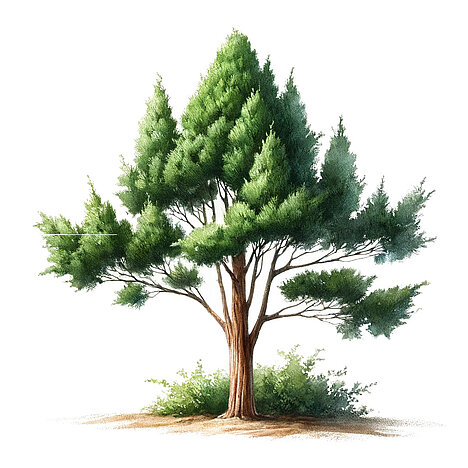Cypress

Cypress is a popular plant that can be found in many gardens and parks. It has a beautiful shape, an evergreen color and a pleasant scent. But is cypress also good for dogs? Or can it even be dangerous? In this article, you'll find out everything you need to know about cypress in relation to dogs.
What is cypress?
Cypress is a genus of the cypress family, which consists of various species. The best-known species is the Mediterranean cypress, also known as the columnar cypress or Italian cypress. It grows mainly in the Mediterranean region and grows up to 6 meters high. Its growth habit is columnar and its foliage is scaly and sticky.
Cypress trees flower very inconspicuously with elongated flowers, the cones are light brown and spherical in shape. The cones only open years later when it is very hot and release their seeds.
Cypress is also used as a medicinal plant, especially the cypress oil extracted from the fruits and young leaves. It has a disinfectant and vasoconstrictive effect and alleviates complaints such as rheumatism, gout, stomach catarrh and inflammation of the eyes and ears.
Is cypress poisonous for dogs?
Unfortunately, the answer to this question is yes. All parts of cypress trees are poisonous to dogs, especially the wood, the sap, the leaf tips and the fruiting bodies. This is due to the essential oils they contain, which include thujene, pinenes, terpenes, camphene, cedrol, furfural, semperviral, sylvestrene, flavonoids and tannins.
These substances can cause skin irritation and even severe symptoms of poisoning in dogs. Simple skin contact through touching is sometimes sufficient. It is even worse if dogs eat parts of the cypress or ingest the sap.
The symptoms of poisoning can vary depending on the amount and type of ingestion, but are typical:
- Reddening of the mucous membrane of the mouth
- Increased salivation (drooling)
- vomiting
- Stomach pain
- diarrhea
- Muscle cramps
- In very severe cases, respiratory paralysis and death
What should I do if my dog has eaten cypress?
If you suspect or observe that your dog has eaten cypress or come into contact with it, you should act immediately. Time can make or break your dog's life.
You should call your vet or the animal emergency service immediately and make sure that a vet is on site so that you can get to them straight away. It is very helpful for the vet to know what your dog has been poisoned with. If possible, take a piece of the plant or a sample of the vomit with you.
The vet will try to remove the poison from your dog's body and alleviate the specific symptoms of poisoning. There are various methods of removing the poison from the body, such as
- The administration of activated charcoal, which binds the poison in the stomach. If possible, this should be done within 2 hours of ingesting the poison so that it does not enter the bloodstream.
- The administration of activated charcoal can be combined with a laxative.
- Inducing vomiting with the help of various medications to get the poison out of the body.
To alleviate the symptoms of poisoning, the vet can give infusions and medication to relieve pain and muscle cramps if necessary.
How can I prevent cypress poisoning?
The best prevention is, of course, to keep your dog away from cypress trees. If you have a cypress tree in your garden, it's best to remove it or at least secure it so that your dog can't reach it. When you take your dog for a walk, make sure he doesn't pick up or play with any cypress branches or twigs.
You should also make sure that your dog does not ingest cypress oil, even if it is used as a remedy. The dose makes the poison, and what can be helpful for humans can be deadly for dogs.
Cypress is a beautiful plant, but unfortunately it is poisonous for dogs. All parts of cypress contain essential oils that can cause skin irritation or even severe poisoning. If your dog has eaten cypress or come into contact with it, you should go to the vet immediately. To avoid poisoning, keep your dog away from cypress and do not use cypress oil.
Cypress is therefore more of a curse than a blessing for dogs. However, there are many other plants that are safe or even healthy for dogs. Therefore, always inform yourself well before planting a plant in your garden or giving it to your dog.
If you notice any signs of hypersensitivity or poisoning in your dog, you should see your vet immediately. We are not a substitute for a vet, but we try to be as accurate as possible. Every dog reacts differently and we recommend you get a second opinion or consult your vet if in doubt.
Stay healthy and take good care of your four-legged friend!😊